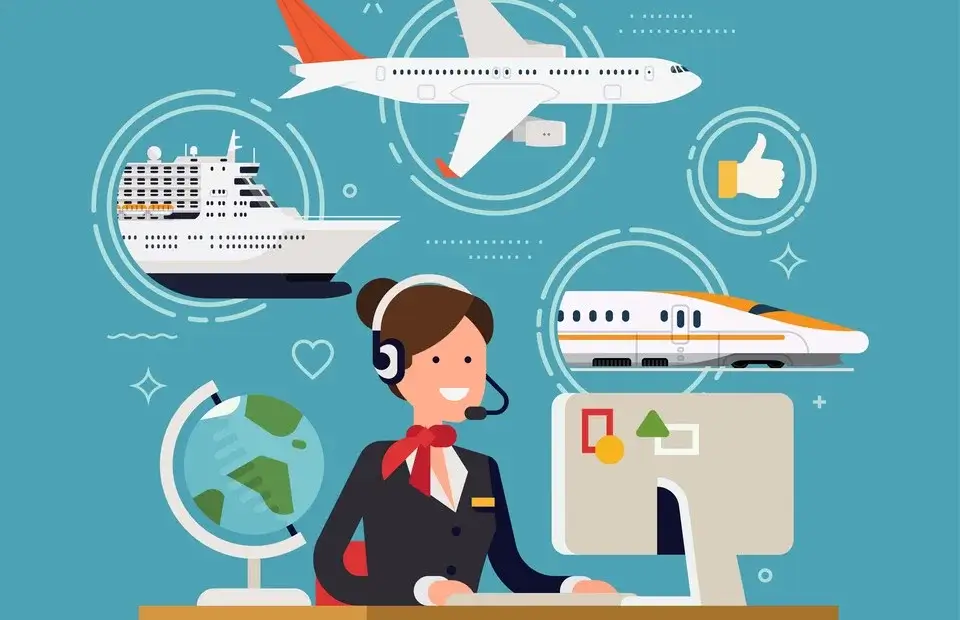Business Travel Guide
The Ultimate Corporate Travel Management Guide for Small Business

Corporate travel management plays a crucial role in ensuring smooth and efficient business trips for small businesses. As companies grow, so do their travel expenses, making it increasingly important to have a well-defined travel management strategy in place. By understanding the components of corporate travel management for small business can streamline your processes, implement cost-saving measures, and improve their employees’ overall travel experience.
Additionally, integrating safety and risk management protocols is essential in the current global landscape, ensuring that your staff is well prepared and protected during their travels.
Understanding Corporate Travel Management
Corporate travel management is a critical aspect of running a successful business, as it involves organising, controlling, and optimising the travel needs of an organisation’s employees1.
One key component of effective corporate travel management is implementing a comprehensive travel policy. A well-developed travel policy ensures that employees comply with company guidelines, reducing expenses and promoting transparency.
A sound travel policy can also aid in establishing preferred arrangements with travel providers such as airlines and hotels, making it more convenient for employees to book their trips.
Moreover, the data generated from travel bookings facilitates real-time reporting, helping companies in further optimisation and adherence to organisational travel policies.
Benefits of implementing a travel policy include:
- Cost control and transparency
- Alignment of travel with corporate goals
- Improved employee satisfaction and productivity
- Enhanced traveller safety
Integrating Travel with Business Strategy
To maximise the value of corporate travel management, it is crucial to align travel plans with the organisation’s overall business strategy. This integration can deliver incremental revenue, as research suggests that for every dollar invested in business travel, companies can earn $12.50 or more.
By incorporating travel management with business objectives, companies can ensure that employee travels are not only cost-effective but also contribute to the growth and success of the company.
This strategic approach can result in increased traveller satisfaction, improved productivity, and enhanced safety, while also maintaining cost efficiency and corporate policies5.
To achieve this integration, the following strategies can be implemented:
- Collaborate with various business departments to gain insights and determine potential areas of improvement in travel policies and practices.
- Monitor and track travel expenses by establishing a customised system that allows the organisation to closely monitor their travel spend and trends.
- Leverage data and analytics to identify opportunities for optimisation, such as renegotiating corporate travel deals or changing travel behaviour.
Setting Up Your Travel Program
1. Choosing the Right Travel Management Company
When starting your travel program, one of the first decisions to make is selecting a suitable travel management company as a small business. An ideal choice should offer customised solutions, 24/7 support, and excellent customer service tailored to your small business’s unique needs.
It’s essential to compare the top companies by evaluating their fee structures, range of services, and reputation in the travel industry. This ensures you obtain a TMC that aligns with your company’s values and objectives.
2. Budgeting for Travel Expenses
Budgeting is a crucial aspect of managing travel expenses and ensuring cost savings for your small business. Start by creating a detailed travel policy, which includes guidelines on flight booking classes, allowable expenses, and accommodation limits.
Implementing expense reporting software can streamline the approval process and reimbursements.
Moreover, consider the following tips to optimise your travel budget:
Early bookings: Book flights and hotels well in advance to secure the best rates.
Leverage discounts: Negotiate corporate deals with preferred hotels, airlines, and travel service providers.
Monitor spending: Actively analyse and assess your company’s travel expenses and trends to identify potential savings.
Implementing Travel Booking Tools
To simplify the booking process and ensure compliance with your travel policy, incorporate travel booking tools that cater to small businesses.
When evaluating travel booking tools, consider the following features:
Centralised booking platform: An easy-to-use tool such as Clooper that allows employees to book hotels, serviced apartments, and arrange both flight and ground transportation in one place.
Policy compliance: A system that reinforces adherence to your travel policy by providing options within allowed parameters.
Real-time reporting: Access to live reports on travel expenses, employee locations, bookings, and trends to support informed decision-making.
Travel Safety and Risk Management
Small businesses need to ensure their employees are well-informed about travel safety precautions. Providing adequate training on potential risks and threats can greatly reduce the likelihood of accidents or incidents occurring during business trips.
A comprehensive travel safety education programme should include:
Awareness of local cultures and customs: Encourage employees to familiarise themselves with the destination’s culture, language, and customs before travelling. This respect for local norms helps avoid misunderstandings or offending the host country.
Ensuring personal safety: Share tips on avoiding pickpocketing, scams, and other common safety risks, such as exercising caution in crowded or unfamiliar areas and protecting sensitive information like passports and travel documents.
Health and well-being: Offer guidance on staying healthy during business trips, including recommendations for vaccinations, medication, and time zone adjustment.
Using reputable transportation providers: Encourage employees to use trusted transportation options, such as licensed taxi services or travel management companies, to ensure reliable and safe transportation throughout their trip.
Developing a Risk Response Plan
Key components of an effective plan include:
Travel policy: Establish clear guidelines for employees to follow in case of an emergency, including contact information and procedures for reporting incidents or seeking assistance2. This may include contact information for the local embassy, insurance providers, or a designated emergency point of contact within the company.
Risk monitoring and assessment: Continuously monitor and evaluate potential threats and vulnerabilities in your business travel destinations. This may be done through news alerts, advice from travel management companies, or governmental sources like the Foreign Travel Advice from the UK Government.
Communication and support: Ensure employees have access to communication tools, such as mobile phones and messaging services, to help them stay connected and informed while travelling. Provide around-the-clock support to address any issues or concerns that may arise.
Review and adaptation: Regularly review and update your risk response plan based on changes in global travel patterns, emerging threats, and feedback from employees. This continuous improvement process ensures your plan remains relevant and effective in addressing current and future risks.
Leveraging Technology for Efficient Travel
1. Utilising Mobile Travel Apps
Mobile travel apps have become indispensable tools for small businesses managing corporate travel. These apps offer a plethora of features that streamline the entire travel process, from booking flights and accommodation to arranging ground transportation and tracking expenses. For example, apps like Clooper greatly simplify the management of business trips.
There are several advantages to utilising mobile travel apps:
- Streamline the booking process by having all travel options in one place.
- Mobile travel apps allow you to monitor travel expenses in real time, ensuring more effective budget management.
- Receive instant notifications about changes in flight schedules, accommodation bookings, and more.
- Easily manage employees’ travel schedules within the app.
2. Exploring Online Expense Reporting
Online expense reporting is another crucial aspect of efficient corporate travel management. Many travel apps offer functionalities that allow for automated expense tracking and management.
Companies can use these features to ensure compliance with travel policies and reduce the turnaround time for reimbursements.
Here are some benefits of online expense reporting:
- Easily track expenses as they occur, ensuring adherence to travel budgets.
- Simplified submission and approval process for employees and managers.
- Automatically flag discrepancies and non-compliant expenses.
- Generate detailed reports for better decision-making and optimisation of resources.
By implementing mobile travel apps and online expense reporting, small businesses can significantly enhance their corporate travel management efficiency.
Key Takeaways
- Developing a clear travel management strategy is vital for small businesses
- Integrating safety and risk management protocols enhances employee travel experience
- Leveraging technology can streamline business travel processes and cut costs




